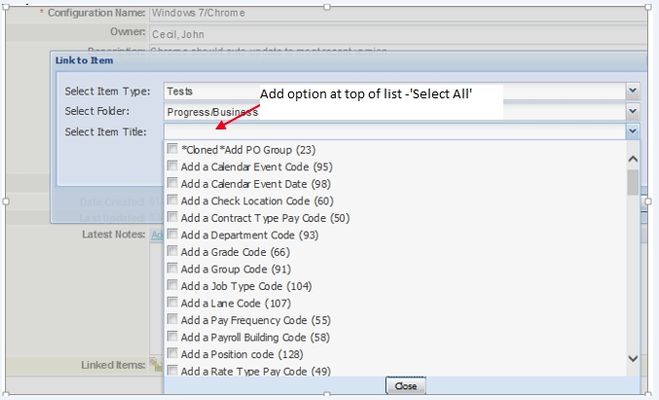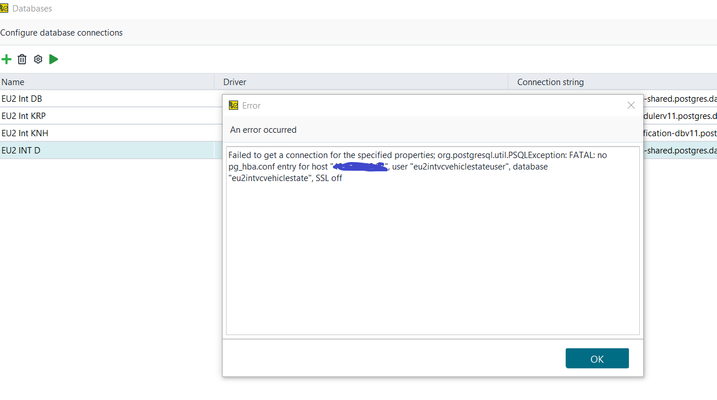Speed up linking of tests to configurations
There are only 2 ways to link a test to a configuration...either 1. select the test (or test set), open the link to items, select the configuration folder, and check each sub item (e.g. Windows8>IE, and Chrome and Firefox), repeating for each config folder. 2. select the configuration, open the link to items, specify type and folder, and individually check every item (test) in the folder. Repeat for every configuration. Even with just a few Windows environments, each with 3 or 4 different browsers, times our 2500 tests, and this is a monumental task. While we could have done it as we created tests, our focus was on creating the tests, and not linking..that was a mistake. However now, we need to make these links, yet we are looking at nearly 10,000 clicks/steps. If nothing else, in the selection of tests (or sets) drop down, add a "Select All" to check all tests in that folder. Then we would just need to repeat for each Configuration, each folder...a much more manageable task.14KViews8likes6CommentsHow to build SQL query using strings whose value should be retrieved from TestCase property
Suppose i have the following properties defined in the Test Case Properties FromTime = 2023-11-15 23:00:00 ToTime = 2023-11-16 23:00:00 I want to replace the time given in the below query with the above test case property variables. How to do that in ReadyAPI JDBC datasource ? SELECT * FROM Table1 where TagId = 4314 and Time > '2023-11-15 23:00:00' and Time < '2023-11-16 23:00:00' I am able to retrieve integer values like TagId and use it by adding 'Prepared Properties' within the JDBC datasource window. But if i add the string and use it inside the query, data is not fetched as the string is not interpreted properly.464Views1like7CommentsIs it possible to integrate the Azure TestPlan Test cases and the ReadyAPI tests ?
I have created manual test cases in Azure devops Test Plan. I have automated the manual test case functionality using ReadyAPI. Now i want to link the Azure Test Plan test cases while running the ReadyAPI tests via the Azure pieplines. Is it possible to do so ? I am using the Azure devops extension named "ReadyAPI Test for Azure Devops" and "Publish Test Results" in my pipeline.239Views1like1CommentHow are you securing secrets for storing your projects in github?
We're trying to migrate our ReadyAPI suites into github and I'm getting a little stuck with ReadyAPI's documentation on how to encrypt passwords we use to test our application, I'm hoping someone has a simple answer they can share. Our application passwords are stored in auth manager or request properties, when this project is converted to a composite project and pushed into github those values are visible so I have followed documentation to try and mask them without success. 1. Encrypt the project - this stops the project being a composite project so we're back to single use for upgrades and preventing people from making changes and keeping them in a branch. Doesn't seem like this fits. 2. Password protect the project - doesn't obsfucate the passwords anywhere. 3. Move the passwords to encrypted properties - Feels very hacky and clunky, makes the auth manager redundant and isn't very user friedly. I haven't been able to find any other in application solutions other than the above, I was looking at keystores/ truststores but neither seem to fit the requirement. This has left us with the only option we can see which is to write a groovyscript to pull the passwords out of an encrypted keepass kdbx file to use at runtime. This is not my preferred approach as I would rather use in built features with ReadyAPI support documentation... If anyone knows of other things to attempt or can share how they managed it in their project that would be appreciated.Solved871Views1like4Comments3.44 issue with java.net.SocketTimeoutException: Read timed out
test step is failing due to "java.net.SocketTimeoutException: Read timed out", we tried increasing the socket timeout but it is still failing after the default 1 minute time. this project and test step is working fine when using 3.41 readyapi version but same test is failing in 3.44 and the latest 3.45 versions. please let us know what need to be done here as this impacting our regression testsSolved1.7KViews1like2CommentsReadyAPI and Jira integration
Hi, I am trying to integrate ReadyAPI version 43.1 and JIRA plugin version 1.6.4 instance so we can push issues from ReadyAPI to JIRA with the hope of creating better traceability. However, when I select the JIRA button at the top of the toolbar, JIRA opens, I select the project and issue type, then select ok. Nothing happens after that. What am I missing here? I was expecting a form to open within ReadyAPI so I can begin to enter details on the issue. Followed this link for set up: https://github.com/SmartBear/ready-jira-plugin/wiki/Creating-JIRA-Items Please find attached images for ReadyAPI logs.347Views1like1CommentConfigure JMS for Websphere IBM MQ 9
Hello everyone, I´am trying to configure JMS for get connected to Websphere IBM MQ. The help does not give any clue how to connect to a remote queuemanager. It only points to a local installation, which I do not have and therefore I am missing the config-values/syntax of the values. I have to set: 1. Initial Context Class: 2. Provicer URL: 3. Connection Factory JNDI Name: I have tried it with: 1. initial.context.class.name=com.sun.jndi.fscontext.RefFSContextFactory 2. tcp://host:port/channel-name 3. connection.factory.name.template=com.ibm.mq.jms.MQQueueConnectionFactory When I test my JMS-Configuration I am getting an error like this: "Could not establish a JMS connection: javax.naming.InvalidNameException: tcp://XXX:2110/XXX [Root exception is java.net.MalformedURLException: unknown protocol: tcp]" Would be glad, if someone has an example for Webspere IBM MQ Regards, Florian652Views1like3Comments



